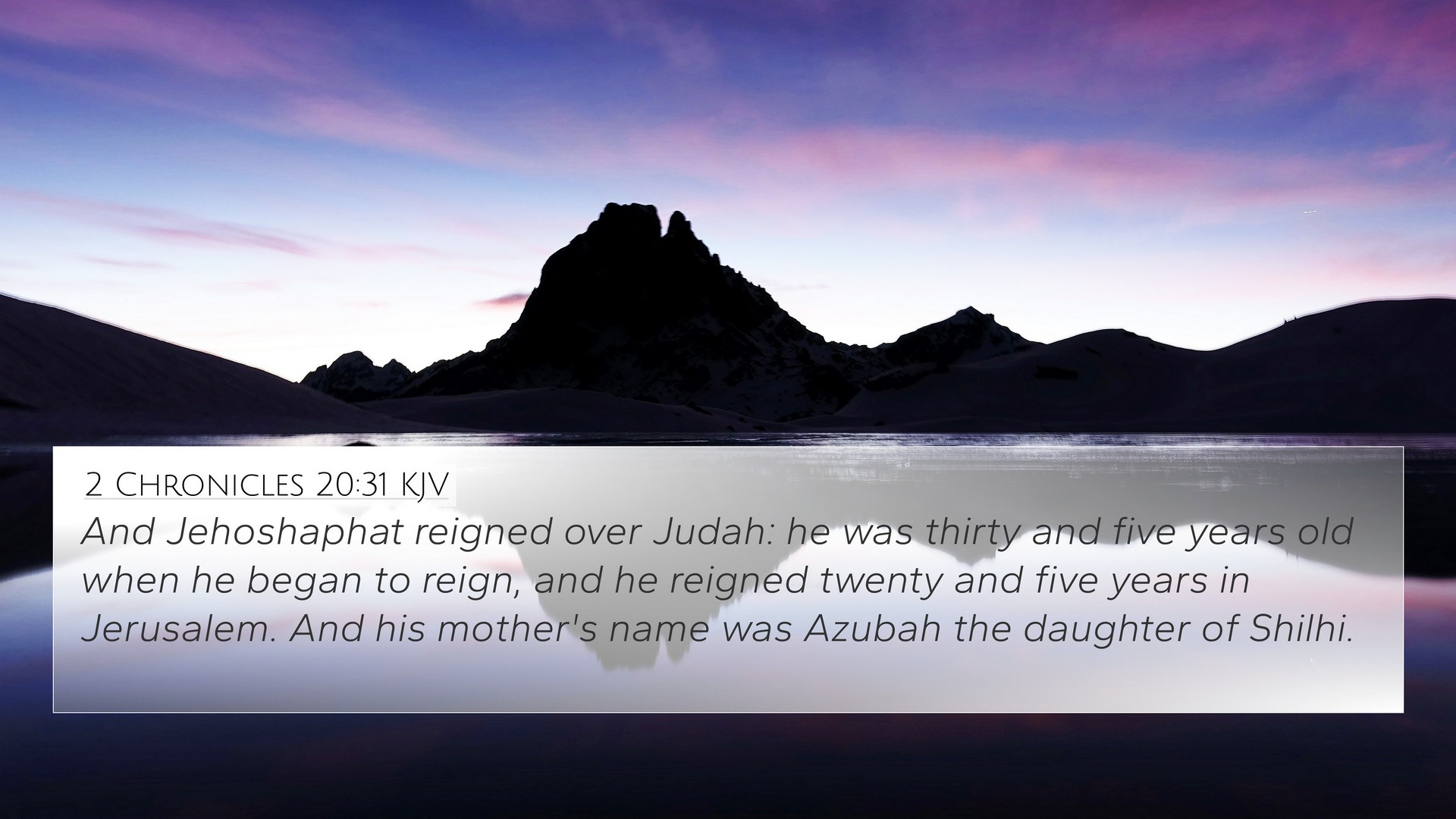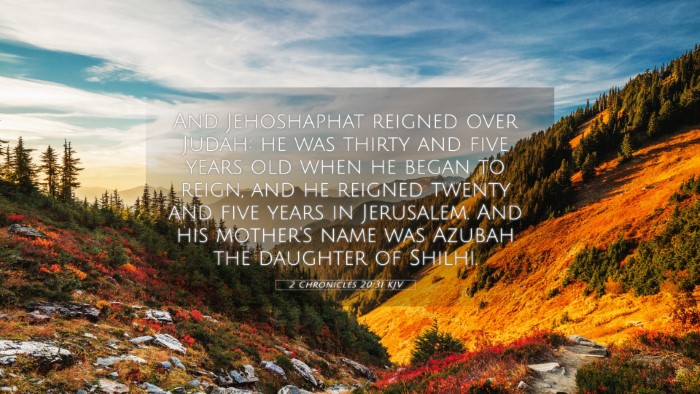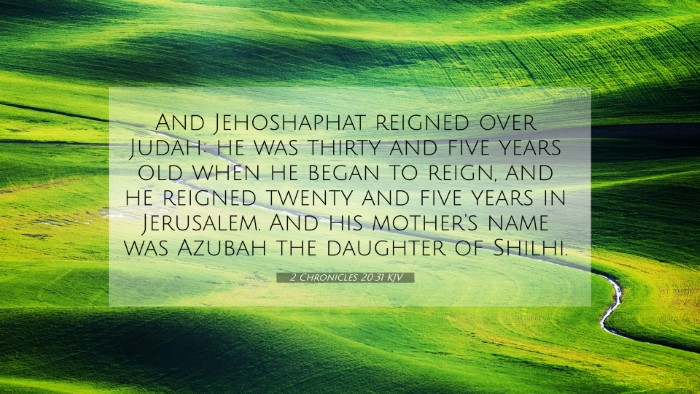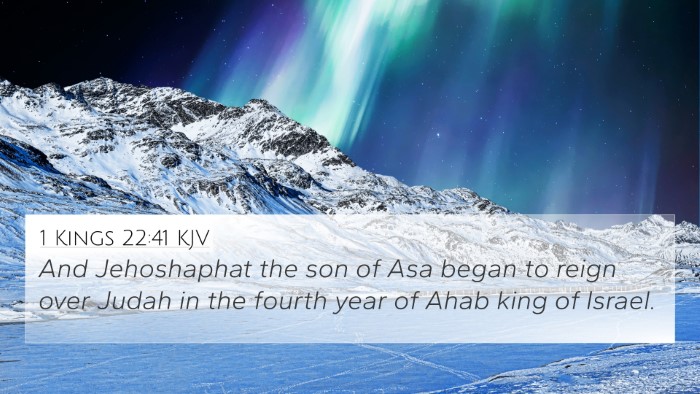Understanding 2 Chronicles 20:31
2 Chronicles 20:31 states, "And Jehoshaphat reigned over Judah. He was thirty-five years old when he became king, and he reigned in Jerusalem for twenty-five years. His mother’s name was Azubah daughter of Shilhi." This verse encapsulates significant historical and theological themes crucial to understanding the context of Judah's monarchy and the reign of King Jehoshaphat.
Contextual Overview
In the context of 2 Chronicles, this passage provides insights into the leadership of Jehoshaphat, emphasizing his role within God's covenant people. King Jehoshaphat was notable for his reforms and dedication to following God’s law, contrasting with his predecessors who often led the nation astray.
Thematic Connections
This verse highlights several themes, including divine sovereignty, leadership, and the importance of righteousness. The connections between Bible verses in this passage can be seen in various aspects of Jehoshaphat's rule and the character of God.
1. Jehoshaphat’s Leadership
Jehoshaphat's reign is marked by his commitment to seeking the Lord. This is evident in his military and spiritual reforms aimed at bringing the nation back to God. His reign is often linked with the broader theme of leadership found throughout the Scriptures, where leaders are called to serve God and their people faithfully.
2. Righteousness and Judgment
Many Bible verses that relate to each other emphasize the significance of righteousness in leadership. Proverbs 16:12 states, "It is an abomination for kings to commit wickedness, for a throne is established by righteousness." Jehoshaphat's efforts in Judah reflect this principle, as he sought to promote justice and righteousness during his reign.
Cross-Referencing Biblical Texts
Exploring cross-references can deepen our understanding of 2 Chronicles 20:31. Below are examples of relevant Bible verse cross-references:
- 2 Chronicles 17:3-6: Discusses the Lord’s favor upon Jehoshaphat, paralleling with his reforms.
- 1 Kings 22:41-50: A parallel account of Jehoshaphat’s reign and his alliance with Israel.
- 2 Chronicles 19:4-11: Jehoshaphat’s efforts to appoint judges that uphold God's law.
- Psalm 96:10: A reminder of God's sovereignty as King, relevant to Jehoshaphat’s reign.
- Micah 5:2: Foretelling the coming ruler, indicating God's plan for His people leads to righteousness.
- Isaiah 33:22: Emphasizes God's role as a judge and lawgiver, relating to Jehoshaphat’s administration of justice.
- Matthew 5:20: Jesus’ call for higher righteousness, echoing the expectations of God’s leaders.
- Romans 13:1-4: Discusses the authority of ruling powers, in continuity with Jehoshaphat's role under God's decree.
- 1 Peter 2:13-14: Relates to civil authority and its divine purpose, akin to Jehoshaphat’s leadership.
- Revelation 19:16: Declares Christ as King of Kings, further grounding the concept of Godly authority in His eternal kingdom.
Reflections on Jehoshaphat’s Faith
Jehoshaphat's reign is an exemplary illustration of the impact of faith-driven leadership. His reliance on God during crises is a reminder for contemporary believers about the significance of faith amidst challenges. This theme resonates with the broader narrative of the Scriptures, encouraging a life of reliance on divine providence.
Practical Application
As we study Cross-referencing Bible study methods like those reflected in 2 Chronicles 20:31, we are encouraged to draw connections that enrich our understanding of God's character and His expectations for leaders.:
- Recognize the importance of integrity and righteousness in leadership.
- Understand the historical context behind the actions of biblical figures like Jehoshaphat.
- Apply the principles of faith and dependency on God in personal leadership roles.
Conclusion
In conclusion, 2 Chronicles 20:31 is not merely a historical observation but a theological reflection on the nature of leadership under God’s sovereignty. By using tools for Bible cross-referencing and comparing various scriptures, believers can establish a comprehensive understanding of biblical leadership and the consistent call for righteousness throughout God's Word.
Final Thoughts
Engaging in a cross-reference Bible study allows for deeper insights into the text, giving life to the lived experiences of those who walked before us in faith. In the pursuit of understanding, we find that Jehoshaphat's story interlinks with an array of Scriptures that collectively testify to God’s everlasting plan for humanity.



